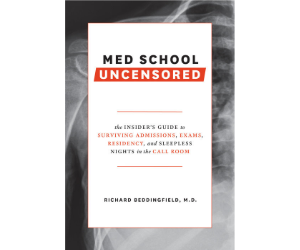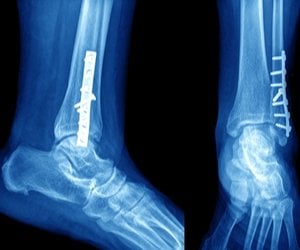
MCAT
You can do almost anything with your smart phone these days. You can video call a friend in China, order pizza with the click of a button, and even see in the dark! So, if ... Read more
Andrew George
Updated June 26, 2022 by Andrew George

MCAT
Overcoming a low MCAT score on your AMCAS application can feel daunting. Can they really judge my whole application by my performance on one 8 hour block of life!!? Sadly, most schools do put extensive ... Read more
David Quinzi
Updated June 26, 2022 by David Quinzi

MCAT
Anyone who has taken or studied for the MCAT Critical Analysis and Reasoning Skills (CARS)—or any other critical reading test—will tell you that these tests can be incredibly challenging. Why is that true, given that ... Read more
AdaptPrep
Updated June 26, 2022 by AdaptPrep

Healthcare News and Policy
No available or affordable program for your healthcare profession in your home state? Take heart! Students in Western U.S. states do have access to affordable professional degree programs in nearly a dozen healthcare specialties, thanks ... Read more
Margo Colalancia
Updated June 26, 2022 by Margo Colalancia

Medical School
While I was a medical scribe in Texas, I had many conversations with doctors about what medical school is like. I vividly remember one instance where a physician responded to the question with, “Medical school ... Read more
Jacob Adney
Updated June 26, 2022 by Jacob Adney

Physician Q&A
1. Tell us about yourself. I’m a 38-year-old anesthesiologist practicing at a busy community hospital in downtown Madison, Wisconsin. I am married and have two rambunctious daughters, ages 6 and 3. I grew up in ... Read more
Student Doctor Network
Updated June 26, 2022 by Student Doctor Network

Pre-Medical
The Multiple Mini Interview, commonly abbreviated to “MMI”, is one of the most dreaded interview formats. Applicants fear the MMI so much that some students literally freeze during their interview! This is because the actual ... Read more
Behrouz Moemeni
Updated June 26, 2022 by Behrouz Moemeni

Pre-Medical
The only real recollections I have of visiting the hospital before college were once as a child undergoing a tonsillectomy and once as a preteen to visit my newborn cousin. Fast forward ten years or ... Read more
Nicole Hawkins
Updated June 26, 2022 by Nicole Hawkins

DentalMedical
Before giving you some specific strategies to ace Casper scenarios, it’s important to step back and talk about where this test comes from and what it’s all about. Casper stands for Computer-based Assessment for Sampling ... Read more
Behrouz Moemeni
Updated July 17, 2022 by Behrouz Moemeni

Pre-Medical
Do you know anyone who raves about their mentor? A mentor can offer you expertise and motivation as you work toward your goal of entering medical school and becoming a doctor. A medical student, professor, ... Read more
AAMC Staff
Updated June 26, 2022 by AAMC Staff

Pre-Medical
The transition from high school to college is stressful for many students, and perhaps more so for those who already have their hearts set on attending medical school. For newly-minted premedical students, the first two ... Read more
Cassie Kosarek
Updated June 26, 2022 by Cassie Kosarek

Pre-Medical
With another busy semester behind you, you might be using your summer to work or volunteer, prepare for the MCAT exam, or work on your medical school applications. But summer is also a good opportunity ... Read more
AAMC Staff
Updated June 26, 2022 by AAMC Staff

MCAT
Walking out of the test center after I had completed the MCAT was a surreal experience. Somehow, the far-off test date for which I had been preparing for months had not only arrived, but had ... Read more
Cassie Kosarek
Updated June 26, 2022 by Cassie Kosarek

Pre-Medical
Sometimes, Susan Mulroney, PhD, professor and director of the special master’s program at Georgetown Medical Center, wonders how she got so lucky. “I wonder- how did people let me get this job? How did I ... Read more
Suzanne Barston
Updated June 26, 2022 by Suzanne Barston

Medical
Ryan Haynes, PhD and Shiv Gaglani, MBA discuss how they went from anatomy partners to the founders of Osmosis, an advanced learning platform that helps medical & other health professional students succeed in classes, on ... Read more
Student Doctor Network
Updated March 7, 2019 by Student Doctor Network

Pre-Podiatry
Hi! My name is Courtney, and I am currently a third year Podiatric Medical student from Indiana, studying in Ohio. I hope that I can help those of you reading this learn a little more ... Read more
Courtney Yoder
Updated June 26, 2022 by Courtney Yoder

Physical Therapy
What is Physical Therapy? Chances are, you’ve heard of physical therapy (PT). Perhaps you have even attended physical therapy as a patient. Maybe a friend or family member has had physical therapy in the past. ... Read more
Meredith Castin
Updated November 28, 2023 by Meredith Castin

Pre-Medical
As a premedical student, you are likely familiar with some of the subjects that are covered in the standard medical school curriculum. After all, how different could biochemistry in medical school be from undergraduate biochemistry? ... Read more
Cassie Kosarek
Updated June 26, 2022 by Cassie Kosarek

Pre-Medical
Sometimes it feels like prepping for med school really is like bracing yourself against the onslaught of an impending natural disaster. You try not to bend and sway in the gust of premed coursework that ... Read more
Atlantis Project
Updated August 23, 2022 by Atlantis Project


















